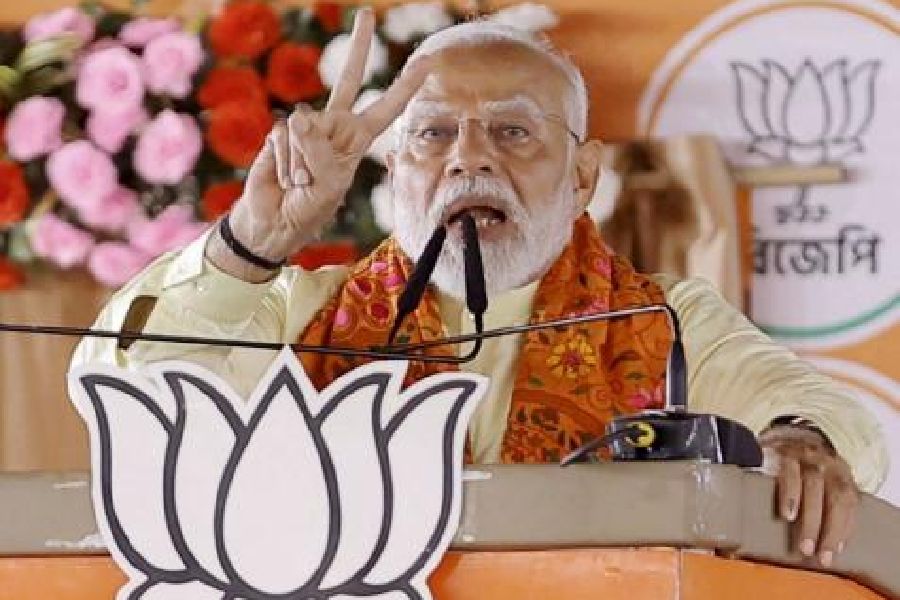Prime Minister Narendra Modi on Sunday spent barely a minute on Sandeshkhali at a rally for the Barrackpore Lok Sabha seat, a neighbouring constituency of Basirhat, where the troubled island is located.
This was a marked departure for the prime minister, who in a dozen Bengal rallies before this, devoted large chunks of his speeches to the strife-torn Sunderbans island of North 24-Parganas, which he and his party were keen on projecting as their foremost poll plank the state.
The passing mention in the speech prompted questions on whether Sandeshkhali was now slipping down the priority list of the BJP, particularly against the backdrop of widely circulated videos that purportedly show a local saffron party leader claiming that the agitation in the island was scripted and many women were paid Rs 2,000 each to lodge fake complaints of sexual crimes against local Trinamool leaders.
On Sunday, Modi landed blow after blow on chief Mamata Banerjee’s party over its alleged priority of tushtikaran (appeasement) — the saffron camp’s term for the politics and policy of ensuring that minorities aren’t marginalised.
In the Chinsurah rally — his second for the day — Modi similarly touched on the Sandeshkhali issue without any elaboration, accusing the ruling party in Bengal of adopting all possible “tactics” against the victims.
While speaking at the Jalebi ground in Kankinara, Modi, at the fag end of his 26-minute speech, alleged that the victims in Sandeshkhali were now facing a “new challenge”.
Blaming the Trinamool government for its silence on the “reign of terror” in the island, Modi said: “The impact of TMC’s misrule has been felt by our mothers and sisters in Sandeshkhali, particularly from SC/ST communities.”
“The perpetrators of Sandeshkhali crime (were) first shielded by TMC’s police. Now they face a new challenge. TMC’s goons are intimidating and threatening the women there solely because the perpetrator’s name is Sheikh Shahajahan. Bombs and guns are being unleashed from his home. But TMC is busy trying to get him clean chit to appease its vote bank,” he further said.
Modi on Sunday delivered speeches at four election rallies in Bengal — Kankinara, Chinsurah, Pursura, and Sankrail.
However, in none of the rallies was he very vocal about Sandeshkhali.
He uttered no word about the videos — now widely circulated — purportedly featuring the local BJP leader Gangadhar Koyal, which cornered the saffron camp because what he said aligned with Trinamool’s narrative of the Sandeshkhali issue being “scripted by the BJP”.
The Bengal unit of BJP was compelled to adopt a defensive strategy claiming that those videos were “fake”. However, Modi preferred to remain silent on the videos.
A leader of BJP’s state committee said: “Modiji might have decided to ignore Trinamool’s propaganda as speaking about the videos would give them unwanted publicity.”
In his March 1 public meeting in Arambagh — Modi’s first in Bengal this election season — he elaborately spoke about the “atrocities” in Sandeshkhali.
Five days later, in his speech in Barasat, he stated that the Sandeshkhali “storm” would sweep across Bengal and ensure an end to the Trinamool regime, before meeting some Sandeshkhali “victims”.
On Sunday, Modi accused Trinamool of creating hurdles in following one’s religious “faith”.
“Once Bengal led the revolutionary movement against intrusion. But, now under the TMC rule, the intruders are flourishing. The situation has become such that practicing one’s faith has become a sin here in Bengal,” Modi said claiming that Hindus become secondary citizens in Bengal.
Modi was also very vocal about Congress for the party-led Karnataka government’s decision for Muslims making “injustice” to the OBC. He, at the same time, criticised the Congress and Trinamool for opposing the CAA, which he termed as “humanist law” into a villain.
Modi also further offered five guarantees — no reservation based on religion,
no abolishing OBC reservation, no one to stop Ram Navami celebrations, no one to overturn the Supreme Court verdict on the Ram Mandir and no one to prevent the implementation of citizenship rules.










